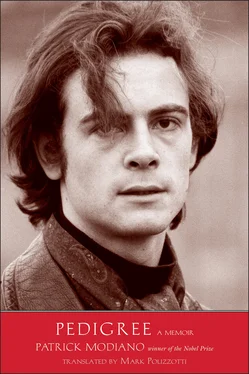Patrick Modiano
Pedigree: A Memoir
Iwas born on July 30, 1945, at 11 Allée Marguerite in Boulogne-Billancourt, to a Jewish man and a Flemish woman who had met in Paris under the Occupation. I write “Jewish” without really knowing what the word meant to my father, and because at the time it was what appeared on the identity papers. Periods of great turbulence often lead to rash encounters, with the result that I’ve never felt like a legitimate son, much less an heir.
My mother was born in 1918 in Antwerp. She spent her childhood in a suburb of that city, between Kiel and Hoboken. Her father was a laborer, then assistant surveyor. Her maternal grandfather, Louis Bogaerts, was a dockworker; he posed for the statue of the longshoreman by Constantin Meunier that stands in front of the Antwerp city hall. I’ve kept his loonboek for the year 1913, in which he recorded the names of all the ships he unloaded: the Michigan , the Elisabethville , the Santa Anna … He died on the job, at around age sixty-five, from a fall.
As a teenager, my mother joined the Faucons Rouges youth group. She worked for the gas company. In the evenings, she took drama classes. In 1938, she was signed by the filmmaker and producer Jan Vanderheyden to act in his Flemish “comedies.” Four films between 1938 and 1941. She was a chorus girl in music hall revues in Antwerp and Brussels; there were many German refugees among the dancers and artists. In Antwerp, she shared a small house on Horenstraat with two friends: a dancer, Joppie Van Allen, and Leon Lemmens, who was more or less the secretary and shill of a rich homosexual, the baron Jean L., and who would be killed in a bombardment in Ostend in May 1940. Her best friend was a young decorator, Lon Landau, whom she’d meet again in Brussels in 1942 wearing the yellow star.
I’m trying to follow chronological order, for want of other reference points. In 1940, once Belgium was occupied, she lived in Brussels. She became engaged to a certain Georges Niels, who at age twenty managed a hotel, the Canterbury. The hotel restaurant was partly commandeered by officers of the Propaganda-Staffel. My mother lived in the Canterbury and met various people there. I know nothing about all those people. She worked in radio, playing in Flemish broadcasts. She was hired by a theater in Ghent. In June 1941, she was in a theatrical tour of the ports along the Atlantic and the English Channel, performing for Flemish workers of the Organisation Todt and, farther north, in Hazebrouck, for German airmen.
She was a pretty girl with an arid heart. Her fiancé had given her a chow-chow, but she didn’t take care of it and left it with various people, as she would later do with me. The chow-chow killed itself by leaping from a window. The dog appears in two or three photos, and I have to admit that he touches me deeply and that I feel a great kinship with him.
Georges Niel’s parents, rich hotel owners from Brussels, did not want their son to marry her. She decided to leave Belgium. The Germans intended to send her to film school in Berlin, but a young officer from the Propaganda-Staffel whom she’d met in the Canterbury got her out of that predicament by sending her to Paris, to Continental Films, a production company, run by Alfred Greven.
She arrived in Paris in June 1942. Greven gave her a screen test at the Billancourt studios, but it wasn’t very convincing. She worked in the “dubbing” department at Continental, writing Dutch subtitles for the French films the company produced. She became the girlfriend of Aurel Bischoff, one of Greven’s assistants.
In Paris, she lived in a room at 15 Quai de Conti, in an apartment rented by an antiques dealer from Brussels and his friend Jean de B., whom I can picture as a teenager, with a mother and sisters in a chateau in the heart of Poitou, writing fervent letters to Jean Cocteau in secret. Through Jean de B., my mother met a young German, Klaus Valentiner, who had secured a cushy administrative post. He lived in a studio on the Quai Voltaire and, in his leisure time, read the latest novels by Evelyn Waugh. He was later sent to the Russian Front and was killed.
Other visitors to the Quai de Conti apartment included a young Russian, Georges d’Ismailoff, who was tubercular but always went out into the frozen winters of the Occupation without an overcoat. A Greek, Christos Bellos: he had missed the last ship leaving for America, where he was supposed to join a friend. A girl of the same age, Geneviève Vaudoyer. All that remains of them are their names. Geneviève Vaudoyer and her father, Jean-Louis Vaudoyer, were the first French bourgeois family to invite my mother to their home. Geneviève Vaudoyer introduced my mother to Arletty, who also lived on the Quai de Conti, in the building next door to number 15. Arletty took my mother under her wing.
I hope I can be forgiven all these names, and others to follow. I’m a dog who pretends to have a pedigree. My mother and father didn’t belong to any particular milieu. So aimless were they, so unsettled, that I’m straining to find a few markers, a few beacons in this quicksand, as one might attempt to fill in with half-smudged letters a census form or administrative questionnaire.
My father was born in 1912, in Square Pétrelle in Paris, on the border of the 9th and 10th arrondissements. His father was originally from Thessaloniki and belonged to a Jewish family from Tuscany established under the Ottoman Empire. Cousins in London, Alexandria, Milan, Budapest. Four of my father’s cousins, Carlo, Grazia, Giacomo, and his wife, Mary, would be murdered by the SS in Italy, in Arona, on Lake Maggiore, in September 1943. My grandfather left Thessaloniki when he was a child and went to Alexandria. But after several years, he left for Venezuela. I believe he had cut all ties with his family and background. He became involved in the pearl trade in Margarita Island, then ran a thrift shop in Caracas. After Venezuela, he settled in Paris in 1903. He ran an antiques shop at 5 Rue de Châteaudun, where he sold objets d’art from China and Japan. He held a Spanish passport, and until the day he died he would be registered at the Spanish consulate in Paris, whereas his forebears, as “Tuscan subjects,” had been under the protection of the French, English, and then Austrian consulates. I’ve kept several of his passports, one of which was issued by the Spanish consulate in Alexandria. And a certificate, drawn up in Caracas in 1894, attesting that he was a member of the Society for the Prevention of Cruelty to Animals. My grandmother was born in the Pas-de-Calais. In 1916, her father lived in a suburb of Nottingham. But after her marriage, she adopted Spanish citizenship.
My father lost his father when he was four. Childhood in the 10th arrondissement, Cité d’Hauteville. Collège Chaptal, where he was a boarder — even on weekends, he told me. And from his dormitory he could hear the music of the street carnival, on the median strip along Boulevard des Batignolles. He never took his baccalaureate exam. As a teenager and young adult, he was left to his own devices. By age sixteen, he and his friends were hanging out at the Hôtel Bohy-Lafayette, the bars of Faubourg Montmartre, the Cadet, the Luna Park. His name was Alberto, but they called him Aldo. At age eighteen, he began smuggling petroleum, sneaking drums of it into Paris undetected by the authorities. At nineteen, he asked a manager of the Saint-Phalle bank to underwrite his “financial” operations, so persuasively that the latter agreed to back him. But the affair went sour, as my father was a minor, and the law stepped in. At age twenty-four, he rented a room at 33 Avenue Montaigne and, according to certain documents I’ve preserved, he often traveled to London to help form a company called Bravisco Ltd. His mother died in 1937 in a boardinghouse on Rue Roquépine, where he had lived for a time with his brother Ralph. Then he had taken a room in the Hôtel Terminus, near the Gare Saint-Lazare, which he’d left without settling his bill. Just before the war, he took over management of a shop selling stockings and perfume at 71 Boulevard Malesherbes. It seems he was then residing on Rue Frédéric-Bastiat, in the 8th.
Читать дальше












